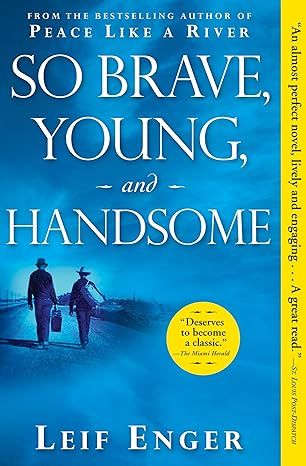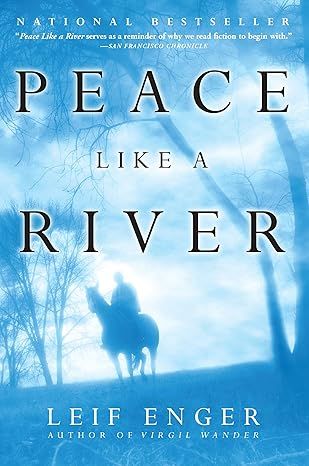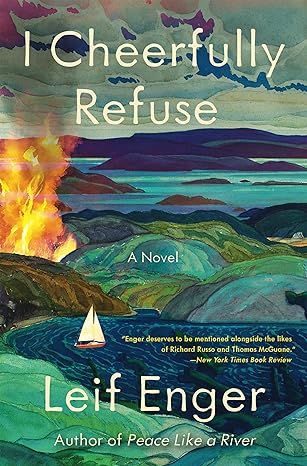So Brave, Young, and Handsome: A Novel
4.4
-
1,291 ratings
“An almost perfect novel” of yearning, adventure, and redemption in the dying days of the Old West from the bestselling author of Peace Like a River (St. Louis Post-Dispatch).
Minnesota, 1915. With success long behind him, writer, husband, and father Monte Becket has lost his sense of purpose . . . until he befriends outlaw Glendon Hale. Plagued by guilt over abandoning his wife two decades ago, Hale is heading back West in search of absolution. And he could use some company on the journey.
As the modern age marches swiftly forward, Becket agrees to travel into Hale’s past, leaving behind his own family for an adventure that will test the depth of his loyalties and morals, and the strength of his resolve. As they flee the relentless former Pinkerton Detective who’s been hunting Hale for years, Becket falls ever further into the life of an outlaw—perhaps to the point of no return.
With its smooth mix of romanticism and gritty reality, So Brave, Young, and Handsome examines one ordinary man’s determination to risk everything in order to understand what it’s all worth, in “an old-fashioned, swashbuckling, heroic Western . . . [An] adventure of the heart and mind (The Washington Post Book World).
Kindle
$2.99
Available instantly
Audiobook
$0.00
with membership trial
Hardcover
$1.59
Paperback
$15.35
Ships from
Amazon.com
Payment
Secure transaction
ISBN-10
0802144179
ISBN-13
978-0802144171
Print length
286 pages
Language
English
Publisher
Grove Press
Publication date
April 07, 2009
Dimensions
5.5 x 1 x 8.25 inches
Item weight
11.8 ounces
Product details
ASIN :
B005BCVBKK
File size :
4426 KB
Text-to-speech :
Enabled
Screen reader :
Supported
Enhanced typesetting :
Enabled
X-Ray :
Enabled
Word wise :
Enabled
Editorial reviews
Deserves to become a classic.”The Miami Herald
An almost perfect novel . . . A great read.”St. Louis Post-Dispatch
A sharp and brainy redemption tale . . . [Enger’s] laid claim to a musical, sometimes magical, and deeply satisfying kind of storytelling.”Los Angeles Times
An adventure of the heart and mind.”Washington Post Book World
Enger is a formidably gifted writer. . . . At times reminiscent of the sinew and gristle in the craggier work of Annie Proulx, and at other times aspiring to a Jean Shepherdesque folk poetry.”Chicago Tribune
A fine novel . . . worthy of comparison with Shane and Monte Walsh and True Grit.”Dallas Morning News
Superbly written, utterly compelling . . . A cracking good adventure tale.”Star Tribune (Minneapolis)
Sample
Chapter One
Not to disappoint you, but my troubles are nothing-not for an author, at least. Common blots aside, I have none of the usual Big Artillery: I am not penniless, brilliant, or an orphan; have never been to war, suffered starvation or lashed myself to a mast. My health is adequate, my wife steadfast, my son decent and promising. I am not surrounded by people who don't understand me! In fact most understand me straightaway, for I am and always was an amiable fellow and reliably polite. You, a curious stranger, could walk in this moment; I would offer you coffee and set you at ease. Would we talk pleasantly? Indeed we would, though you'd soon be bored-here on Page One I don't even live in interesting surroundings, such as in a hospital for the insane, or on a tramp steamer, or in Madrid. Later in the proceedings I do promise a tense chase or two and the tang of gunpowder, but here at the outset it's flat old Minnesota and I am sitting on the porch of my comfortable farmhouse, composing the flaccid middle of my seventh novel in five years.
Seven novels, you exclaim-quite right, but then I didn't finish any of them. I'm grateful for that, and you should be too. Number Seven featured a handsome but increasingly bilious ranch hand named Dan Roscoe. A right enough pard to begin with, he became more arrogant page by page. No laconic wit for Dan! It was himself I was writing about, with many low sighs, the morning I first saw Glendon Hale rowing upstream through the ropy mists of the Cannon River. What a cool spring morning that was-birdsong, dew on the blossoms-I yearned to be on the river myself, but Dan Roscoe had rustlers to catch and a girl to win. Neither seemed likely. How often I sighed in those days! I needed a revelation but you know how it is. I would have settled for a nice surprise.
Hearing the groan of oarlocks I peered downriver. A white-headed fellow was rowing up out of the haze.
He rowed standing, facing forward, a tottery business; twice as I watched, one of his narrow sweeps missed the water completely and he lurched like old Quixote, hooting to himself. The truth is he appeared a bit elevated, early though it was. As I say, he was white-haired with a white mustache and he wore white shirtsleeves and his boat too was white above the waterline, so that he had a spectral or angelic quality only somewhat reduced by his tipsy aspect.
Forth he came through the parting mists. To this day I don't know what took hold of me as he approached. I stood from my work and called hello.
"Hello back," said he, not pausing in his strokes.
"Pretty vessel," I called.
"Pretty river," he said, a simple reply that made me ache to be afloat. But he wasn't slowing, as you might expect a polite person to do, and I stepped off the porch and jogged down to the stubby dock my son had built for fishing.
"Can you stop a minute? There's coffee," I said-sounding pushy, I suspect, though I am no extrovert; ask Susannah.
"Maybe," he said, yet he was already well past me and in fact the haze was closing round him again. I had a last glimpse of his boat-its graceful sheer and backswept transom. Then it disappeared, though I could hear in the fog the dip of the old man's oars, his screeling oarlocks, and what might have been a laugh of delight, as though he'd vanished by some mystic capacity that tickled him every time.
I went heavily back to the porch. My boy Redstart was there grinning-he was eleven, Redstart, catching up with his papa in all kinds of ways.
"Who was that man?" he inquired.
"I don't know."
"Was he drunk, do you think?"
"Anything's possible."
"He rows standing up," said Redstart. "I never saw that before. Did you talk to him?"
"No, I didn't." I couldn't look at the boy for a moment or two. I was embarrassed at how much I'd wanted to visit with the man in the boat, and how unaccountably sorry I was that he'd just rowed away. I sat in my chair and lifted pages into my lap. Dan Roscoe was waiting for me in those pages-boy, he was morose. Who could face it?
"I can still hear him," Redstart said, "out in the mist. Can you hear him rowing, Papa?"
I looked at my son, the lover of mysteries. You could never guess what Redstart might say, for his mind was made of stories; he'd gathered all manner of splendid facts about gunpowder and deserts of the world and the anchoring of lighthouses against the furious sea; he knew which members of the James gang had once ridden into our town to knock over a bank and been shot to moist rags for their trouble; and about me he knew some things not even his mother knew, such as the exact number of novels I had abandoned on that porch. He whispered, "How many words today, Papa?"
I made a quick and not altogether honest guess. "Two hundred or so."
"It's early still, that's pretty good," he replied, then sat and shut his eyes and leaned awhile. I knew he should go take the horses to pasture or mulch the tomatoes but I didn't want to lose his company. I picked up my pen and wrote: As Dan Roscoe branded each bawling calf with the Moon Ranch insignia, he recalled how Belle had clung to the arm of his hated rival-a moribund sentence that announced the death of my seventh novel. It didn't surprise me. I had the grim yet satisfactory thought that it wouldn't surprise Dan Roscoe, either. Well, let him moan! I was sick of Dan and his myriad problems.
"Red," said I, "here's an idea. Why don't you go in the house and lay hands on a few of your mother's orange rolls. Let's climb in the boat and head upstream."
"Hmm," said Redstart. He dawdled to his feet; he said "Well" a couple of times.
"Well, nothing," I said. "We don't even need the rolls. Let's catch up with that old man. I want to talk to him."
Redstart went to the door. Poor reluctant boy; long my joyous accomplice in distraction, he had lately been run to ground by his efficient and lovely and desperate mother. He didn't want to shame me, but what choice did I give him?
"I guess we better not, Papa. You got to get your work done. Remember what Mama said?"
Chapter Two
What Susannah said was, approximately, If you don't soon finish that book of yours, we'll have to start selling the furniture. Lest you read in her words a tone of panic, let me assure you there was none. She was only letting me know where things stood. The end of money didn't mean the end of much-the end of our marriage, say, or even of Susannah's obstinate confidence in me. At worst it meant the end of pretense. The end of my little run at distinction. To say it truly: the end of pride. I was the one who panicked.
Here's how I came to this sorry pass. In the fall of 1910 I published a short novel called Martin Bligh, which became so popular I quit being a postman and started calling myself an author. Who knows how these things happen? The book was just an adventure tale. Nothing ambitious. I only wrote it for entertainment and to gratify a sort of wistful ache-Martin Bligh was a postman too, though as a Pony Express rider he had a better shot at glory and peril than I in my tinctured cell at the Northfield P.O. It was a story to make a boy lean forward; it had Indians and great ships and the buried gold of Coronado and two separate duels, including one with sabers. I also added a black-haired senrita because my own Susannah loves a romance, yet Bligh was reviewed in a Chicago newspaper as "disturbingly real," no doubt because some of the Indians adorned their pintos with bloody blond scalps. That the haggard and venerated Buffalo Bill Cody read my story and praised it in newspaper interviews did not hurt the book at all, though it hardly explains why the first printing of three thousand copies disappeared in two weeks. My publisher, Hackle & Banks, New York, was startled enough to wire me congratulations and print another four thousand, which sped from the warehouse in exactly twelve days. At this I received a second telegram: BLIGH OUR FASTEST SELLER. THANK YOU. GRACE. I was ignorant at the time that Grace was Grace Hackle, the generous and canny widow of Dixon Hackle, who had founded the publishing firm twenty years before.
Then letters began to arrive. I was still employed at the P.O. and was startled in the sorting room when envelopes bearing my name began crossing the desk. I rarely received mail-when I did it was apt to be from my mother, whose letters were straightforward offerings of gained wisdom. These on the other hand were praise from strangers who had read my little tale. To call these readers charitable doesn't touch it. They were lavish and interpretive; they were "stirred." The daunting and completely unforeseen fact was this: They had mistaken me for a person of substance! I blushed but kept the letters. When I did hear from my mother, sometime later, she suggested I cling to my place at the post office and not let publication make me biggity. Fine advice, you will agree, yet vanity is a devious monkey. While some labeled my story nave or my diction purple, I clove to a review calling it "an enchanting and violent yarn spun in the brave hues of history." A famous ladies' journal claimed I'd crafted "the ideal popular tale." By the time Mama wrote I was miles past her advice. By then Grace Hackle had sent me several elegant personal notes. She had paid for Susannah and me to ride the Great Northern from St. Paul to New York City, where she registered us in a hotel with frescoes and high ceilings. She had accompanied us to a stage play, then to a restaurant lighted the amber of sunsets, where we ate fresh sea bass and talked of books and authors.
"It is destined timing," Grace declared. "You have dared paint a romance on the sterile canvas of our age." She was a perfectly beautiful tidy small woman with the metropolitan habit of placing events in the big picture. She believed romance was no mere ingredient but the very stone floor on which all life makes its fretful dance. Having traveled once as far west as the Black Hills she still awoke from dreams of rock and prairie. She confessed to a fascination with the architecture of tepees. William Howard Taft might be president, Grace noted, but who did not miss Teddy Roosevelt? "The strenuous life," she sighed.
Looking back, I have to laugh. You know why Martin Bligh was strenuous? Whenever I didn't know what to write next, I put a swift river in front of his horse and sent the two of them across!
"And now," Grace added, "tell me you plan to write another book."
I looked at Susannah, who was squeezing my hand under the table. I had never thought about another book.
Grace sipped tea. "You have some ideas, I suppose."
"Why, yes," I said, though my lone idea at the moment was the fragile sweetheart Grace herself had just planted: that I was an Author now, that I had new Business upon the Earth, that the tedium of sorting mail might be exchanged for something more expansive or-dare I say it?-Swashbuckling.
"Can you write another book?" she asked, rather baldly.
I thought about it. Martin Bligh had not been difficult to write; whatever I wanted to do, that's what Martin did. He rode in all weathers, flouting night and blizzard; he defied the wicked; he kissed the pretty girl. How hard could it be to do something similar again? I said, "Indeed I can."
Grace's eyes were unconvinced. Perhaps she saw what I could not.
Wanting to please her I made a hasty claim. "I shall write one thousand words a day until another book is finished."
"You dear man," said Grace Hackle. In memory she blanches at my nave pledge, but maybe not.
"Jack London sets down a thousand a day before breakfast," said I. Why do the foolish insist? But I was thinking of the modest dimensions a thousand words actually describe-a tiny essay, a fragment of conversation. "How hard can it be?" concluded your idiot narrator, lifting his glass to the future.
Read more
About the authors
Leif Enger
Leif Enger worked as a reporter and producer for Minnesota Public Radio for nearly twenty years before leaving to write fiction full-time. He lives in Minnesota with his wife Robin.
Reviews
Customer reviews
4.4 out of 5
1,291 global ratings
Michelle K
5
A classic
Reviewed in the United States on April 10, 2024
Verified Purchase
This is an endearing story filled with warmth and lovable characters, but what truly sets Enger's books apart is his writing style. The man has a gift with words. I could read a story he wrote about watching the grass grow. Every sentence is a delight !
JLValdez
5
This book has spoiled me for any other.
Reviewed in the United States on December 10, 2023
Verified Purchase
A perfect tale well told. The exciting and surprising story unfolds gently, with delight and effervescence. It coaxed me along with it, inviting - convincing - me to root for scallawags and wish to know them personally. And like the very best books do, caused no small sorrow when the last page is read.
Hostahost
5
another hit
Reviewed in the United States on July 29, 2008
Verified Purchase
Leif Enger is back. His "Peace Like a River" is such a phenomenal book, and while this one doesn't quite measure up to its predecessor, it presents us once again with some down-to-earth but often colorful and complex characters who get caught up in events that frequently escalate. I sometimes wondered why the main character kept pursuing his neighbor--not sure that was well-developed enough. Yet it is a point that would be good for discussion, and perhaps that is Enger's reason for not pointedly stating it. It also stirs up consideration of the wanderlust that may exist in many hearts. Enger's narrative is again wonderful and beautifully wrought. It was often a pleasure just to read the beautiful way he put words down on paper. This is one author I will look for again.
Read more
Top Leif Enger titles
View allSimilar Books
Best sellers
View all
The Tuscan Child
4.2
-
100,022
$8.39

The Thursday Murder Club: A Novel (A Thursday Murder Club Mystery)
4.3
-
155,575
$6.33

Sapiens: A Brief History of Humankind
4.6
-
140,302
$13.49

The Butterfly Garden (The Collector, 1)
4.3
-
88,556
$9.59

Things We Hide from the Light (Knockemout Series, 2)
4.4
-
94,890
$11.66

The Last Thing He Told Me: A Novel
4.3
-
154,085
$2.99

The Perfect Marriage: A Completely Gripping Psychological Suspense
4.3
-
143,196
$9.47

The Coworker
4.1
-
80,003
$13.48

First Lie Wins: A Novel (Random House Large Print)
4.3
-
54,062
$14.99

Mile High (Windy City Series Book 1)
4.4
-
59,745
$16.19

Layla
4.2
-
107,613
$8.99

The Locked Door
4.4
-
94,673
$8.53









